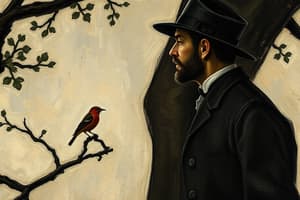Podcast
Questions and Answers
What are the reasons that Alexandra disagrees with Atticus about the threat from Ewell?
What are the reasons that Alexandra disagrees with Atticus about the threat from Ewell?
Alexandra believes that the Ewells will seek revenge and that Ewell's actions are unpredictable.
According to Atticus, what is optimistic about Tom's case?
According to Atticus, what is optimistic about Tom's case?
Atticus believes that once the higher court reviews the case, Tom has a good chance of going free or receiving a new trial.
If Tom is found guilty on appeal, what will his punishment be and why?
If Tom is found guilty on appeal, what will his punishment be and why?
Tom's punishment will be death because rape is a capital offense in Alabama.
Briefly summarize Jem and Atticus's discussion about the problems with the legal system.
Briefly summarize Jem and Atticus's discussion about the problems with the legal system.
When Atticus says, 'one of these days we're going to pay the bill for it,' what does he mean?
When Atticus says, 'one of these days we're going to pay the bill for it,' what does he mean?
According to Atticus, what are three reasons why many Maycomb citizens do not want to serve on a jury?
According to Atticus, what are three reasons why many Maycomb citizens do not want to serve on a jury?
What does Atticus reveal about one of the jurors during the trial?
What does Atticus reveal about one of the jurors during the trial?
What does Scout declare she will do regarding Walter Cunningham when school starts?
What does Scout declare she will do regarding Walter Cunningham when school starts?
What physical signs indicate that Jem is growing up?
What physical signs indicate that Jem is growing up?
What upset Scout more than anything else according to Aunt Alexandra's remarks?
What upset Scout more than anything else according to Aunt Alexandra's remarks?
How does Jem describe the social hierarchy in Maycomb?
How does Jem describe the social hierarchy in Maycomb?
What does Jem mean by 'background' and how does Scout respond to his theory?
What does Jem mean by 'background' and how does Scout respond to his theory?
What conclusion does Jem draw about Boo Radley?
What conclusion does Jem draw about Boo Radley?
Flashcards are hidden until you start studying
Study Notes
Atticus and the Ewell Threat
- Atticus remains unconcerned about Bob Ewell's threat, believing Ewell's credibility has been irreparably damaged.
- He prefers Ewell directing his anger at him rather than at innocents like Mayella or her siblings.
- Alexandra warns that the Ewells may act furtively, suggesting a sneaky form of revenge.
Tom Robinson's Case
- Atticus expresses optimism about Tom Robinson's chances for a new trial or acquittal after an appeal.
- If convicted, Tom faces a death penalty due to the capital nature of the rape charge in Alabama, reflecting the racial biases inherent in the trial process.
Legal System Issues
- Jem struggles to articulate the flaws in Tom's punishment but believes that capital offenses should be reconsidered.
- Atticus critiques the reliance on circumstantial evidence for death sentences, advocating for eyewitness testimony.
- They discuss the systemic issues with jury verdicts, with Jem suggesting eliminating juries while Atticus proposes that judges should decide penalties in capital cases.
Social Justice and Accountability
- Atticus warns that systemic injustices against Black individuals will eventually lead to consequences for the white community.
- He highlights the reluctance of Maycomb citizens to serve on juries due to fear of retribution or personal biases.
Juror Dynamics
- A juror from the Cunningham family signified a potential shift in communal attitudes by holding out for acquittal.
- Atticus notes that earning the respect of a Cunningham can garner loyalty, indicating shifting perceptions.
Class and Prejudice
- Scout expresses her intention to invite Walter Cunningham over, but Aunt Alexandra's prejudice against lower-class families is evident.
- Aunt Alexandra labels Walter Cunningham as "trash," demonstrating her contempt for those she deems socially inferior.
Jem's Growth and Understanding
- Jem exhibits physical signs of maturity, such as developing body hair, highlighting the transition into adolescence.
- Scout feels hurt by Aunt Alexandra's harsh words toward Walter Cunningham, indicating her sensitivity to injustice.
Social Hierarchy in Maycomb
- Jem outlines a social hierarchy consisting of four groups: ordinary folks, Cunninghams, Ewells, and Black individuals.
- This structure reflects the entrenched racism and classism within Maycomb's community.
Background and Worth
- Jem associates "background" with educational opportunities, implying the Finch family's superiority over the Cunninghams.
- Scout counters this notion by advocating for the intrinsic equality of all individuals, regardless of socioeconomic status or education.
Boo Radley's Isolation
- Frustrated by societal prejudices, Jem perceives Boo Radley’s continued seclusion as a desire to avoid the cruelty of people.
- This insight reflects Jem's growing awareness of the complexity of human behavior and the consequences of social dynamics.
Studying That Suits You
Use AI to generate personalized quizzes and flashcards to suit your learning preferences.




